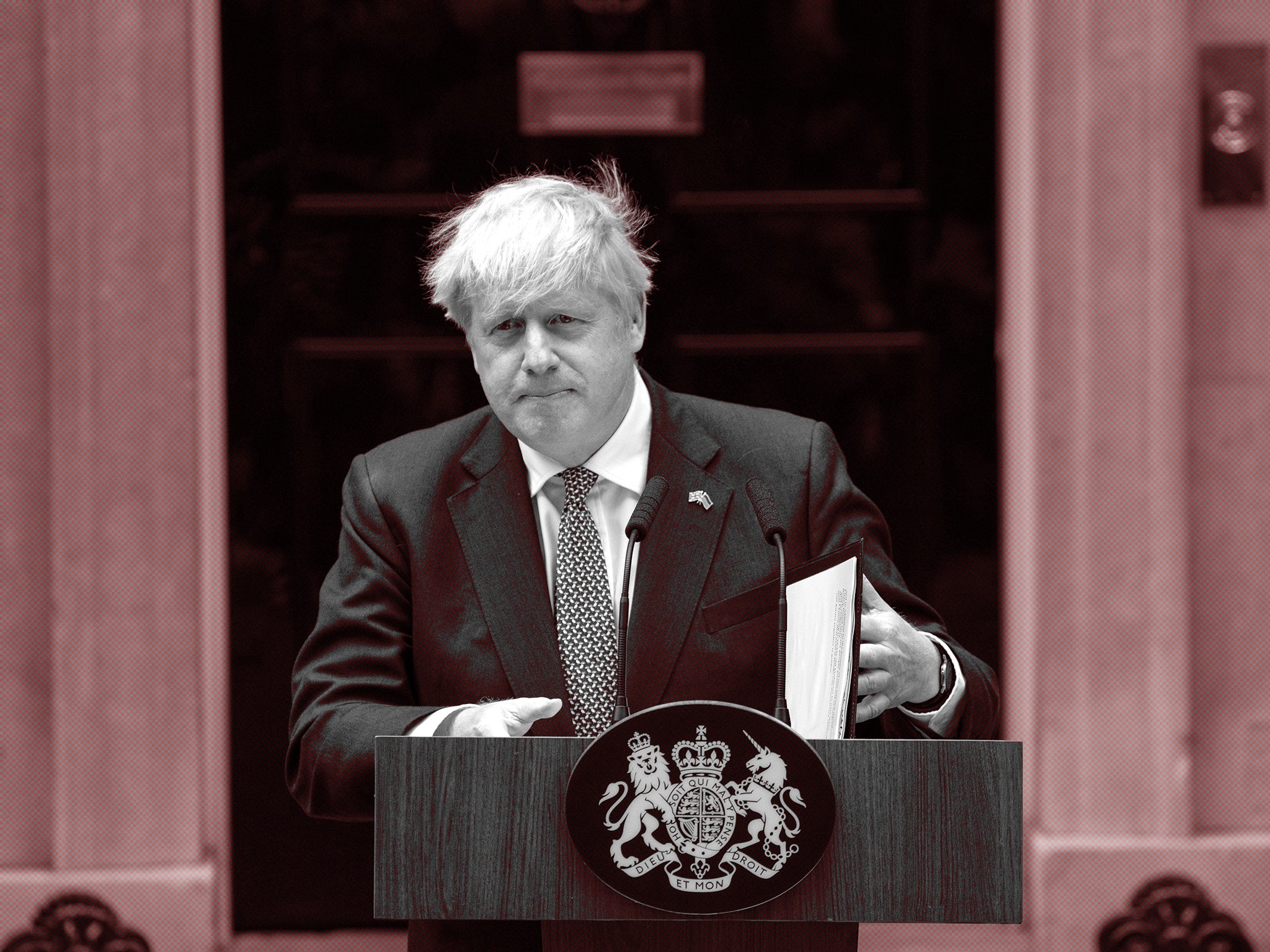Boris Johnson’s toxic resignation honours list should be the last
Recipients of Johnson’s baubles might feel obliged to support a comeback bid, says Andrew Grice


Although Boris Johnson’s long-awaited resignation list is less toxic than his original proposal of about 100 names, it is still controversial. The number was cut to 38; officially this happened during the Cabinet Office vetting process, but Downing Street’s influence was surely felt, even though it denied any input.
Out went Johnson’s father Stanley, to whom Boris wanted to give a knighthood. Rishi Sunak rightly judged that a step too far, as did the 308,000 people who signed The Independent’s petition opposing the idea.
Also missing was Paul Dacre, editor-in-chief of Daily Mail publisher DMG Media, after doubts were expressed by the House of Lords Appointments Commission, which vets nominations for peerages.
Johnson’s original list was a characteristic two-fingers to the establishment as he departed the stage, while simultaneously making use of a tool of the establishment that has existed since the first recipients of resignation honours were nominated by Lord Rosebery in 1895.
The final list invited claims of cronyism by rewarding key Johnson allies, such as Jacob Rees-Mogg, Priti Patel, and many former aides – notably some of those embroiled in the Partygate scandal. They included Martin Reynolds, Johnson’s former private secretary, who was dubbed “Party Marty” for inviting 200 people to “bring your own booze” to the Downing Street garden. Also on the list was Shaun Bailey, the Tories’ former candidate for London mayor, who resigned from two City Hall posts after attending a party thrown by his staff during lockdown; and Ben Elliot, an erstwhile Tory co-chair and former party fundraiser.
Johnson’s list is controversial because he still harbours hopes of a sensational comeback to No 10. His chances are fading, but allies insist they are not dead. This raises the prospect that people awarded honours might feel obliged to support such a return. The antiquated system has been tolerated as a farewell pressie for a politician as they retire from frontline politics. Johnson shows little sign of doing that.
Although Johnson won’t see it like this, No 10 has saved him from deeper damage. The stink will be less strong now that the list is smaller than the number of honours bestowed by David Cameron (59) and Theresa May (51), John Major (50) and Margaret Thatcher (42).
In a break with tradition, Johnson wanted to hand peerages to four MPs and defer them until after the general election. That was blocked after the Lords commission ruled it constitutionally improper. Sunak appeared to have avoided any by-elections – until Nadine Dorries, Johnson’s cheerleader-in-chief, who had wanted a peerage, dramatically announced her immediate resignation. Her 24,664 majority in Mid Bedfordshire looks good on paper, but the grim message for the Tories from last month’s local elections in England is that no seat is safe at present. Another headache for the PM from Team Johnson.
The list is not the first to provoke controversy. In 1976, Harold Wilson unwittingly allowed himself to be remembered for the most infamous resignation honours – dubbed the “lavender list” for being written on coloured notepaper by Marcia Williams, his closest adviser. It included businessmen Joseph Kagan – later convicted of false accounting – and Eric Miller, who committed suicide while the subject of a fraud investigation. Other names were James Goldsmith, the Eurosceptic who founded the Referendum Party, showbusiness figures Bernard Delfont and Lew Grade, and George Weidenfeld, Wilson’s publisher.
Wilson deserved a better legacy. He won four elections, but his list reinforced critics’ image of him as shifty and untrustworthy. Johnson’s will probably have a similar effect. To the end, he was someone who acted as if rules applied only to other people.
Sunak will hope that allowing Johnson to exercise his right to a list will improve the acrimonious relations between them. I suspect he will be disappointed.
Johnson’s actions over the Covid inquiry show his strategy is to make the PM’s life as difficult as possible. His allies still peddle the fiction that Sunak brought him down by resigning as chancellor. Yet the only person who brought Johnson down was himself.
To Sunak’s chagrin, the list will not take Johnson out of the headlines. He has just received the draft findings of the Commons privileges committee’s inquiry into whether he lied to parliament over Partygate. Its final report is due to be published at the end of this month.
The PM will not try to rescue Johnson by whipping Tory MPs to vote down a suspension of 10 days if the committee recommends such a punishment, which would allow a recall petition and likely trigger a by-election in Johnson’s Uxbridge and South Ruislip seat.
There is no rule saying an outgoing PM must issue an honours list. Tony Blair and Gordon Brown didn’t, although 16 Labour politicians appeared in a dissolution honours list to mark the 2010 election. Cameron, despite his modernising credentials, resuscitated the archaic system in 2016. He should have buried it. Although Liz Truss wants a slimline list and is believed to have put forward four names, she doesn’t deserve one after just 49 days in power.
Johnson’s resignation list should be the last.
Join our commenting forum
Join thought-provoking conversations, follow other Independent readers and see their replies
Comments
Bookmark popover
Removed from bookmarks